
warlord-naru
Information security professional for a major firm. Overall geek and gamer. Lover of all things Sighthounds. My immune system hates me, along with the occasional attempted suffocation done thanks to my lungs. On top of that, working through severe depression and anxiety plus a side of ADHD. I'm a broken human being.
186 posts
Latest Posts by warlord-naru







Suspicious friends… the webtoon readers said that at least they got his nose right :,D
Patreon | Redbubble | Webtoon










Happy Halloween to all the little wyrmlings!! I’m in university now so there’s been a loooong wait for the next comic, but here it is!
Patreon | Redbubble | Webtoon
It really sucks being out of work. I know that it's been a month and half since I lost job, but it feels like an eternity. I hate having no income coming in. I'm glad that I saved up a lot of money while working, but still....
My mental health took a hit because of it and I'm trying to build a new routine. It's hard because the holidays are coming up and new levels of stress.
I lost my job last week. I came back from vacation to be thrown into a meeting into HR and my manager to be told that I'm being let go. It's so stupid. They didn't even give me a chance to wrap my day up or finish anything that was outstanding.


I just heard a sad little huff so I peered over my tablet and

I made the “excellent corvid” sticker-friendly and uploaded it along with many others on my Redbubble! Do check it out if you like to have dragons and crows inhabit your lair! ⬇️
LINK TO STICKERS
The above art is a sticker too btw >:D
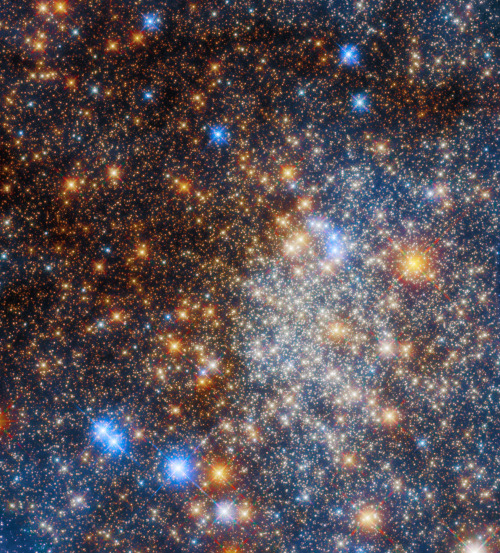
Pumpkin space latte, anyone? ☕
Hubble captured this festive array of stars, Terzan 12, found in the Milky Way about 15,000 light-years from Earth. The stars in this cluster are bound together by gravity in a sphere-like shape and are shrouded in gas and dust. As the starlight travels through that gas and dust to Earth, blue light scatters, leaving the redder wavelengths to come through.
Download the full-resolution image here.
Make sure to follow us on Tumblr for your regular dose of space!




Happy pumpkin season from Fig!






A throwback to the very first comic, where Swordfish threw up a bucket of water and a live fish :) He’s finding new uses for his unique ability now! 🌧
Patreon | Webtoon | Redbubble

This episode of Bluey is called:
Camphor Tree










Ominous..

I love how he said this but is literally besties with Hobie
YES!!!
Ok I get where everyone is coming from when they see the design of Pavitr ‘Pav’ Prabhakar aka Indian SpiderMan as an expression of gender queerness, but let me be frank this is very typical Indian male costuming.
Even the toxic masculine patriarchal men have similar stylistic expressions or to be be more precise this is a traditional/historical/ye olde male aesthetic.
Having said that I love what design elements are being used here. So…
Let's take it from the top.
The FACE MASK

The Three Colors surrounding the eyes are typical spider man colours but they are done to evoke the image the traditional makeup done for the ancient dance art Kathakali. In which the whole face is painted and bold lines are drawn to emphasise/exaggerate the eyes. These eye mask lines are usually thin - bold-thin.
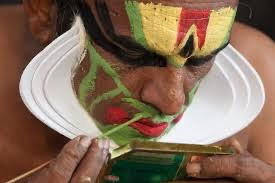


Same with the white lines on the cheek bones which are indicative of tusks or pincers of demons or Animorphs in folklore/myths.

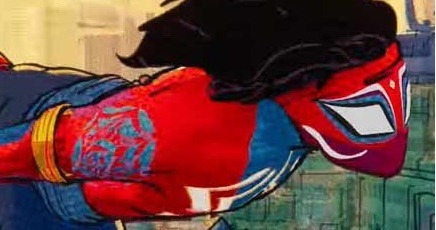

The white dot in the centre of the forehead is the most common Hindu motif, expressed in myriad of ways all over the country .

The ARM/LEG BANDS/CUFFS
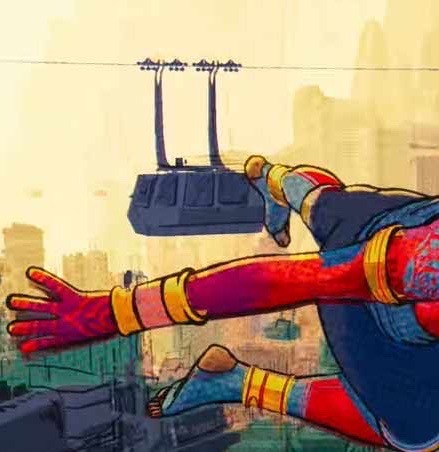
The bicep cuff is a part of Indian historic armour - made of malleable metal, its bejewelled ornate counterparts were then worn in day to day life. Here in the north Royals still wear it during big ceremonies. These metal bands are generally worn by warriors.



bangles (metal circles worn at wrists) are an important male accessory and are more daily wear even in present modern times, some religions (Sikh,Jain etc.) require the males to always wear one at all times. The ones on the suit were more in the shape of wrist guards which again were an armour accessory. In Indian male clothing the cuffs are usually emphasised.


Due to traditional male footwear being sandals metal ankle cuffs were employed to guard the shins and were worn during wars while thinner bands - ornamental accessories - were worn in daily wear.
There are so many other things I want to elaborate on like: The PATTERNS/LOGO,The LEG GARMENT (??!)(what’s the collective term for clothes for legs?), The Cat’s Cradle swinging/body animation ; but my ADHD is already acting up so imma leave this here.
SIDE NOTE:
I love how the heel and toes are bare in this design. It makes sense from the spider powers perspective - no barrier in contact allows for better manoeuvring and jump control as is seen in gymnastics. But also because in Hindu culture important tasks including some traditional sports require the removal of footwear and getting feet dirty is not discouraged (of course with an adherence to washing of the feet multiple times in a day)
I also loved how incorporated his wrist guard is in his spider style using it as a toy and a tool. This aspect of making use of something in a completely different way was so desi ‘Jugaad’ I was stunned.
Celebrate Earth Day with NASA

"We came all this way to explore the Moon, and the most important thing is that we discovered the Earth." - Apollo 8 astronaut Bill Anders
On Dec. 24, 1968, Anders snapped this iconic photo of "Earthrise" during the historic Apollo 8 mission. As he and fellow astronauts Frank Borman and Jim Lovell became the first humans to orbit the Moon, they witnessed Earth rising over the Moon's horizon. The image helped spark the first #EarthDay on April 22, 1970.
Anders sat down with Dr. Kate Calvin, our chief scientist and senior climate advisor, to chat about the photo, and NASA’s role in studying our home.
Make sure to follow us on Tumblr for your regular dose of space!
Sakura to Supernova

This rare sight is a super-bright, massive Wolf-Rayet star. Calling forth the ephemeral nature of cherry blossoms, the Wolf-Rayet phase is a fleeting stage that only some stars go through soon before they explode.
The star, WR 124, is 15,000 light-years away in the constellation Sagittarius. It is 30 times the mass of the Sun and has shed 10 Suns worth of material – so far. As the ejected gas moves away from the star and cools, cosmic dust forms and glows in the infrared light detectable by NASA's James Webb Space Telescope.
The origin of cosmic dust that can survive a supernova blast is of great interest to astronomers for multiple reasons. Dust shelters forming stars, gathers together to help form planets, and serves as a platform for molecules to form and clump together, including the building blocks of life on Earth.
Stars like WR 124 also help astronomers understand the early history of the universe. Similar dying stars first seeded the young universe with heavy elements forged in their cores – elements that are now common in the current era, including on Earth.
The James Webb Space Telescope opens up new possibilities for studying details in cosmic dust, which is best observed in infrared wavelengths of light. Webb’s Near-Infrared Camera balances the brightness of WR 124’s stellar core and the knotty details in the fainter surrounding gas. The telescope’s Mid-Infrared Instrument reveals the clumpy structure of the gas and dust nebula of the ejected material now surrounding the star.
Make sure to follow us on Tumblr for your regular dose of space!







👹👹👹
Feed the dragon by supporting me on Patreon | See all comics on Webtoons!



Elysium Inviting.



The Collector
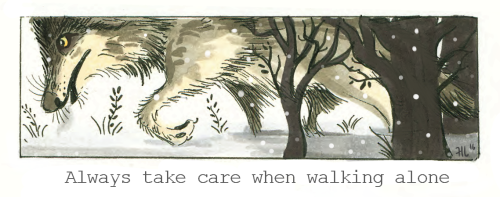
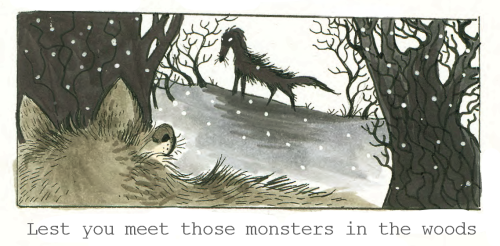
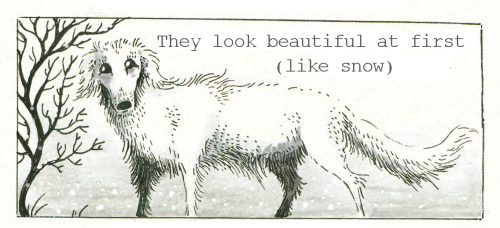
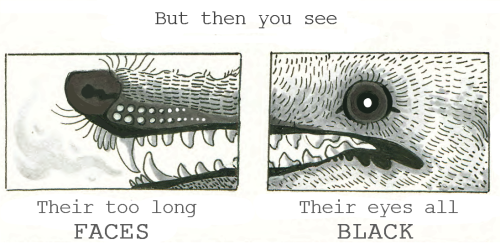
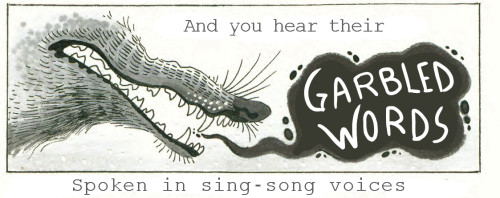
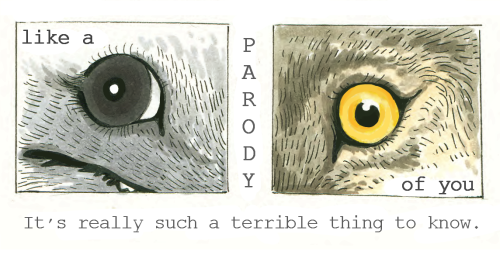
“Lie close,” Laura said, Pricking up her golden head: “We must not look at goblin men, We must not buy their fruits: Who knows upon what soil they fed Their hungry thirsty roots?”
A wolf goes for a walk in the woods and meets a dog for the first time




More like ghastly and CORVID garments 🎃🕸
You can help me make more comics by following me on Webtoon! 🍭






👹👹👹
Feed the dragon by supporting me on Patreon | See all comics on Webtoons!
NASA’s Artemis I Rocket is on the Launch Pad — and in Your Living Room
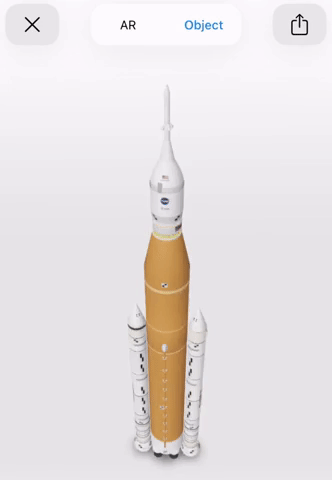
Artemis I will be the first integrated flight test of the Space Launch System (SLS) rocket and Orion spacecraft: the rocket and spacecraft that will send future astronauts to the Moon!
Before we embark on the uncrewed Artemis I mission to the Moon and back, the rocket and spacecraft will need to undergo a test at the launch pad called a “wet dress rehearsal.” This test will take the team at NASA’s Kennedy Space Center in Florida through every step of the launch countdown, including filling the rocket’s tanks with propellant.
But in the meantime, you can take a closer look at SLS and the Orion spacecraft by downloading the 3D model for free on the NASA app! You can view the SLS model in augmented reality by placing it virtually in your own environment – on your desk, for example. Or standing beside your family pet!
SLS and Orion join more than 40 other 3D models in the app, including BioSentinel, one of 10 CubeSats flying aboard Artemis I.
Make sure to follow us on Tumblr for your regular dose of space!
You Are Made of Stardust
Though the billions of people on Earth may come from different areas, we share a common heritage: we are all made of stardust! From the carbon in our DNA to the calcium in our bones, nearly all of the elements in our bodies were forged in the fiery hearts and death throes of stars.
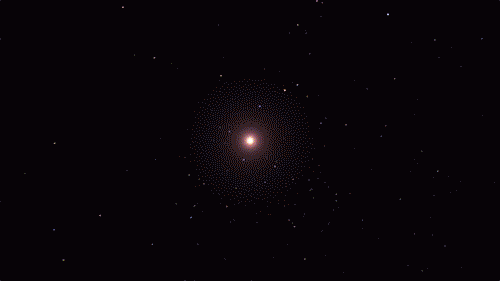
The building blocks for humans, and even our planet, wouldn’t exist if it weren’t for stars. If we could rewind the universe back almost to the very beginning, we would just see a sea of hydrogen, helium, and a tiny bit of lithium.
The first generation of stars formed from this material. There’s so much heat and pressure in a star’s core that they can fuse atoms together, forming new elements. Our DNA is made up of carbon, hydrogen, oxygen, nitrogen, and phosphorus. All those elements (except hydrogen, which has existed since shortly after the big bang) are made by stars and released into the cosmos when the stars die.

Each star comes with a limited fuel supply. When a medium-mass star runs out of fuel, it will swell up and shrug off its outer layers. Only a small, hot core called a white dwarf is left behind. The star’s cast-off debris includes elements like carbon and nitrogen. It expands out into the cosmos, possibly destined to be recycled into later generations of stars and planets. New life may be born from the ashes of stars.
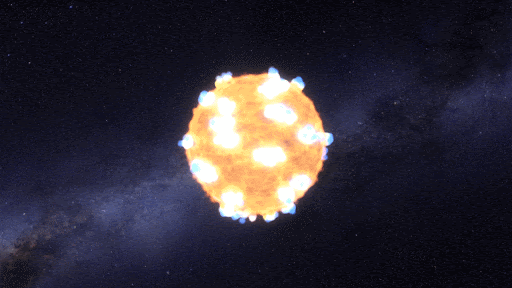
Massive stars are doomed to a more violent fate. For most of their lives, stars are balanced between the outward pressure created by nuclear fusion and the inward pull of gravity. When a massive star runs out of fuel and its nuclear processes die down, it completely throws the star out of balance. The result? An explosion!
Supernova explosions create such intense conditions that even more elements can form. The oxygen we breathe and essential minerals like magnesium and potassium are flung into space by these supernovas.
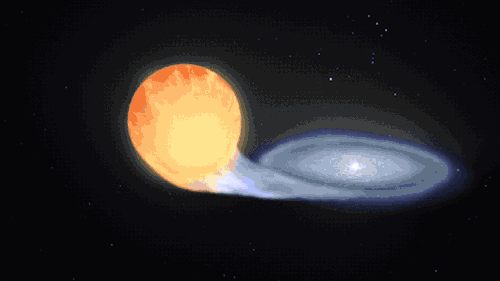
Supernovas can also occur another way in binary, or double-star, systems. When a white dwarf steals material from its companion, it can throw everything off balance too and lead to another kind of cataclysmic supernova. Our Nancy Grace Roman Space Telescope will study these stellar explosions to figure out what’s speeding up the universe’s expansion.
This kind of explosion creates calcium – the mineral we need most in our bodies – and trace minerals that we only need a little of, like zinc and manganese. It also produces iron, which is found in our blood and also makes up the bulk of our planet’s mass!

A supernova will either leave behind a black hole or a neutron star – the superdense core of an exploded star. When two neutron stars collide, it showers the cosmos in elements like silver, gold, iodine, uranium, and plutonium.

Some elements only come from stars indirectly. Cosmic rays are nuclei (the central parts of atoms) that have been boosted to high speed by the most energetic events in the universe. When they collide with atoms, the impact can break them apart, forming simpler elements. That’s how we get boron and beryllium – from breaking star-made atoms into smaller ones.
Half a dozen other elements are created by radioactive decay. Some elements are radioactive, which means their nuclei are unstable. They naturally break down to form simpler elements by emitting radiation and particles. That’s how we get elements like radium. The rest are made by humans in labs by slamming atoms of lighter elements together at super high speeds to form heavier ones. We can fuse together elements made by stars to create exotic, short-lived elements like seaborgium and einsteinium.
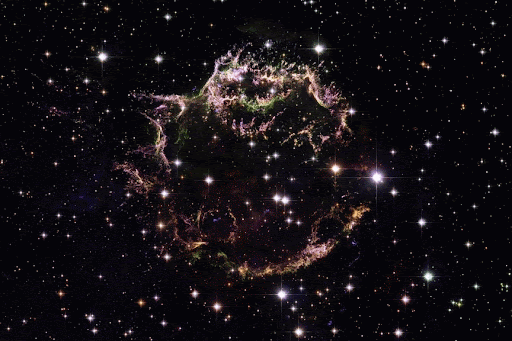
From some of the most cataclysmic events in the cosmos comes all of the beauty we see here on Earth. Life, and even our planet, wouldn’t have formed without them! But we still have lots of questions about these stellar factories.
In 2006, our Stardust spacecraft returned to Earth containing tiny particles of interstellar dust that originated in distant stars, light-years away – the first star dust to ever be collected from space and returned for study. You can help us identify and study the composition of these tiny, elusive particles through our Stardust@Home Citizen Science project.
Our upcoming Roman Space Telescope will help us learn more about how elements were created and distributed throughout galaxies, all while exploring many other cosmic questions. Learn more about the exciting science this mission will investigate on Twitter and Facebook.
Make sure to follow us on Tumblr for your regular dose of space!
The Adventures of Commander Moonikin Campos
Artemis I will be an enormous step toward humanity’s return to the Moon. This mission will be the first flight test of the integrated Space Launch System rocket and the Orion spacecraft — the same system that will send future Artemis astronauts to the Moon. That’s why NASA needs someone capable to test the vehicle. Someone with the necessary experience. Someone with the Right Stuff. (Or... stuffing).

Meet Commander Moonikin Campos. He is a manikin, or a replica human body. Campos is named after Arturo Campos, a trailblazing NASA employee who worked on Apollo missions. Arturo Campos’ skill as an electrical engineer was pivotal in the rescue efforts to help guide the Apollo 13 astronauts home.

As the leader of the mission, Commander Campos will be flying in the pilot’s seat for the length of the mission: a journey of 1.3 million miles (~2 million km) around the Moon and back to Earth. He's spent years training for this mission and he loves a challenge. Campos will be equipped with two radiation sensors and will have additional sensors under his headrest and behind his seat to record acceleration and vibration data throughout the mission.

Traveling with Campos are his quirky companions, Zohar and Helga. They’re part of a special experiment to measure radiation outside of the protective bubble of Earth’s atmosphere. Together with their commander, they’re excited to play a role in humanity’s next great leap. (And hopefully they can last the entire flight without getting on each other's nerves.)

Will our brave explorers succeed on their mission and ensure the success of future Artemis operations? Can Commander Moonikin Campos live up to the legacy of his heroic namesake?? And did anyone remember to bring snacks??? Get the answers in this thrilling three-part series!

In the first part of Commander Moonikin Campos’ journey, our trailblazing hero prepares for liftoff from NASA’s spaceport at Kennedy Space Center in Florida, gets acquainted with the new hardware aboard the Orion spacecraft, and meets his crewmates: Helga and Zohar!

In the second part of the trio’s adventure, Campos, Helga, and Zohar blast out of the Earth’s atmosphere with nearly 8.8 million pounds (4 million kg) of thrust powering their ascent. Next stop: the Moon!

In the final chapter of the Artemis I mission, Campos and friends prepare for their return home, including the last and most dangerous part of their journey: reentering Earth’s atmosphere at a screeching 25,000 miles per hour (40,000 kph).
Make sure to follow us on Tumblr for your regular dose of space!

